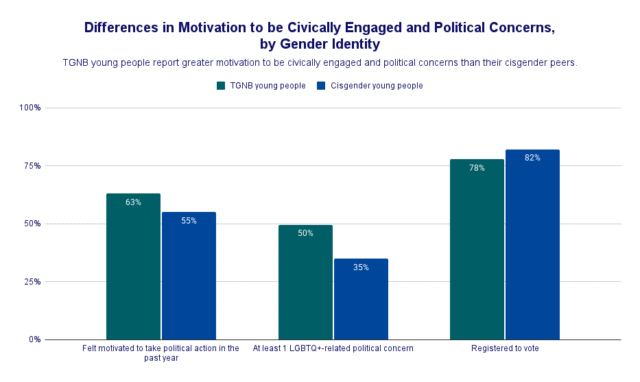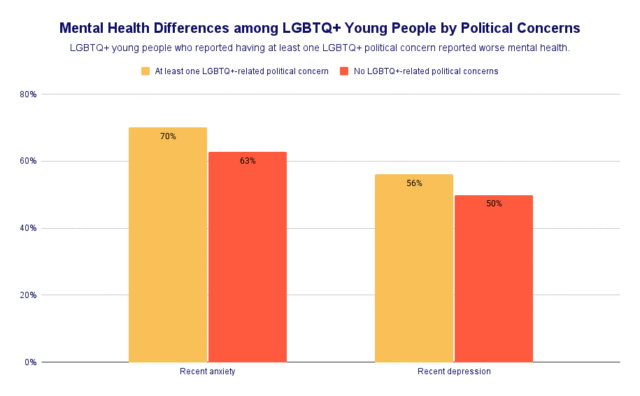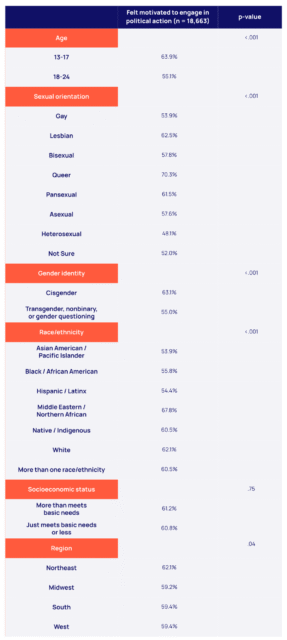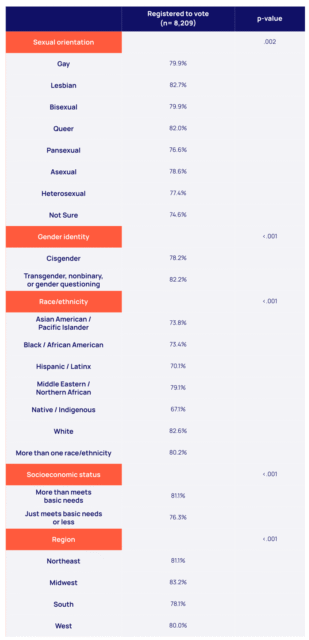Political engagement among LGBTQ+ young people is on the rise, but activism comes with emotional costs. New data from The Trevor Project’s 2024 National Survey on the Mental Health of LGBTQ+ Young People reveals how civic involvement intersects with mental health, especially for transgender and nonbinary (TGNB) youth.
Who’s Engaged?
In the past year, 60% of LGBTQ+ young people reported feeling motivated to take political action, from volunteering to attending events or contacting elected officials. Motivation was particularly high among TGNB youth (63%), queer (70%), and lesbian (63%) youth. Age also played a role: young adults 18-24 reported more engagement than teens 13-17 (64% vs. 55%).
Regional and racial differences emerged as well. Youth in the Midwest (63%) felt slightly more driven to act than peers elsewhere, while Middle Eastern/North African (68%) and White (62%) LGBTQ+ youth led in motivation among racial groups.
Politics on the Mind
Concerns about anti-LGBTQ+ policies were common. Nearly 44% of LGBTQ+ youth reported at least one LGBTQ+-related political worry, ranging from access to healthcare to relocating for safety. TGNB youth were again more affected (50%) than cisgender peers (35%). Older youth (18-24) expressed more concerns than younger teens, and socioeconomically vulnerable youth reported worries at higher rates (52% vs. 43%).

Geography mattered, too. LGBTQ+ youth in the South had the highest political concerns (54%) compared to other regions, reflecting the localized intensity of anti-LGBTQ+ rhetoric.
Voting and Barriers
Among young adults 18-24, 80% were registered to vote, but disparities persisted. Cisgender youth (82%) and those meeting basic needs (81%) led in registration, while TGNB youth (78%) and those with financial insecurity (76%) lagged. Regional trends mirrored political concerns: Northeast youth (83%) were most likely to be registered, the South least (78%).
These differences point to structural barriers such as ID requirements, housing instability, and transportation issues, which disproportionately affect marginalized LGBTQ+ communities.
The Mental Health Link
Civic engagement isn’t always protective for LGBTQ+ youth. Motivation to take political action was associated with higher odds of recent anxiety, and reporting LGBTQ+-related political concerns correlated with both anxiety and depression.
This pattern contrasts with research in the general youth population, where civic engagement often boosts mental well-being. For LGBTQ+ youth, political threats can simultaneously inspire activism and generate stress, making the relationship more complicated.

Looking Forward
The findings underscore the need for supportive and inclusive spaces that allow LGBTQ+ young people to engage politically without sacrificing mental health. Reducing systemic barriers to voting and civic participation, especially for TGNB and socioeconomically disadvantaged youth, is key.
Regional differences also highlight that local politics shape youth experiences, activism in the South may carry unique emotional burdens due to harsher political climates and fewer legal protections.
To support LGBTQ+ young people, organizations like The Trevor Project offer resources on allyship, community building, and navigating hostile political environments. The Movement Advancement Project also provides insights on how state policies affect LGBTQ+ youth well-being and mobility.
Civic engagement matters, but so does creating a world where LGBTQ+ young people can participate safely, fully, and without compromising their mental health.
Motivation to Participate in Political Action, by Participant Characteristics

LGBTQ+-Related Political Concerns, by Participant Characteristics

Voter Registration, by Participant Characteristics




